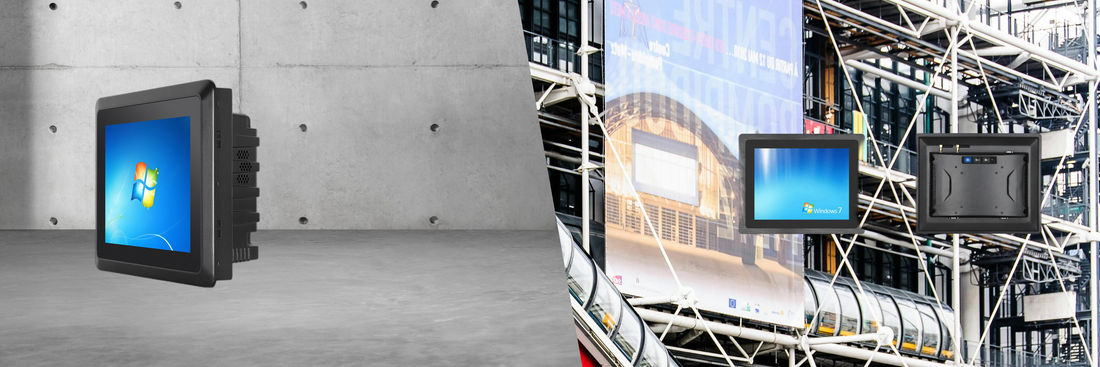
Ultimate Guide to Small Form Factor Rugged PCs: Everything You Need to Know About Industrial-Grade Compact Computing
Ultimate Guide to Small Form Factor Rugged PCs: Everything You Need to Know About Industrial-Grade Compact Computing
In the world of industrial computing, the demand for rugged, compact systems that deliver top-tier performance has been rising steadily. Small Form Factor (SFF) rugged computers, designed to thrive in harsh environments, have emerged as powerful solutions without the bulk of traditional systems. Whether it's extreme temperatures, exposure to dust or water, or vibrations and shocks, these small yet durable machines can handle it all.
This guide will walk you through what a Small Form Factor Rugged PC is, how it works, and how to choose the right one for your specific needs. By the end, you'll understand the critical features that make these devices indispensable in industries ranging from military and defense to manufacturing and remote field operations.
What is a Small Form Factor Rugged PC?
A Small Form Factor Rugged PC is essentially a compact industrial computer engineered to withstand harsh environmental conditions. Unlike conventional desktop PCs, SFF rugged computers are designed for areas where space is limited but reliability and performance are critical.
The ruggedization process ensures that these computers can endure extreme temperatures, shocks, vibrations, and other hostile factors. Their compact size allows them to fit into confined spaces where regular computers would be impractical. These attributes make SFF rugged PCs ideal for industrial automation, transportation, defense, and oil and gas sectors.
Key Features of SFF Rugged PCs:
- Compact size: Allows for installation in tight or restricted environments.
- Durable design: Built to withstand extreme conditions like high temperatures, moisture, and heavy vibrations.
- Performance-oriented: Despite their size, they often match the computational power of larger systems.
Choosing the Right Small Form Factor Rugged PC
Selecting the best SFF rugged computer for your needs can be a challenging task, especially when it comes to balancing performance, size, and durability. Let’s break down the essential factors to consider.
- Processor (CPU) Selection
The CPU is the heart of any computing system. For rugged PCs, choosing the right processor is crucial as it determines the system's performance capabilities. Various workloads require different levels of computational power.
- Low-powered processors (e.g., Intel® Celeron® J1900): Suitable for less demanding applications like data telemetry or remote monitoring.
- High-powered processors (e.g., Intel® Core® i3, i5, i7): Necessary for demanding tasks like AI edge computing, inference analysis, or machine learning algorithms.
The CPU's core count and clock speed will influence its ability to handle multiple processes at once. Multi-core processors are ideal for parallel computing tasks like deep learning, where simultaneous data processing is required.
- System-on-Chip (SoC) vs. Socket CPUs
- SoC systems combine the CPU and GPU on a single chip, making them ideal for low-power, space-efficient applications with less intensive processing needs.
- Socket CPUs offer better performance and heat management but come at the cost of increased power consumption and cooling requirements.
For many industrial applications, SoC systems strike the right balance between power consumption and processing ability, making them a good fit for IoT and embedded systems.
- Cooling Solutions
Efficient cooling is paramount, particularly in fanless designs where heat must be dissipated passively. SFF rugged PCs rely on heatsinks and a well-engineered external chassis to transfer heat from internal components to the surrounding air. The external fins on these PCs expand the surface area, optimizing heat dissipation.
In passive cooling systems, heat is moved through thermal conduction from internal components to the outer shell, preventing overheating without the use of fans.
- RAM and Memory Considerations
The amount of Random Access Memory (RAM) plays a significant role in system responsiveness. If your applications are memory-intensive or you need to run multiple processes simultaneously, higher RAM capacities will ensure smoother operation.
RAM acts as the computer’s short-term memory, storing data temporarily while it’s being processed. This is especially critical in industrial settings where operations often run 24/7.
- More RAM = Better Multitasking: For instance, running multiple AI models or processing large datasets requires systems with ample RAM.
- Storage Solutions: SSD vs. HDD
SFF rugged PCs can be configured with either Solid-State Drives (SSD) or Hard Disk Drives (HDD). SSDs are preferred for rugged environments due to their reliability and faster data access times compared to HDDs, which contain moving parts and are more susceptible to damage.
- NVMe SSDs offer the fastest read/write speeds, making them ideal for applications requiring rapid data transfer.
- Environmental Considerations
One of the most critical aspects of selecting an SFF rugged PC is understanding the environment it will operate in. These devices are specifically built to handle tough conditions, but not all rugged PCs are created equal.
- IP Ratings: PCs deployed in particularly dusty or wet environments might need IP65 or even IP69K certification to ensure protection against water and dust ingress.
- Shock and Vibration Resistance: In industries such as defense or transportation, the ability to resist mechanical stress is crucial.
The design of these computers eliminates fans and cables, making them much less prone to damage from external elements, ensuring reliable operation even in the most demanding situations.
- Connectivity Options: Wired & Wireless
In industrial deployments, reliable connectivity is crucial. SFF rugged PCs come with a variety of wired and wireless communication options.
- Wired Options: Typically, these computers feature multiple Gigabit Ethernet ports with support for Power-over-Ethernet (PoE), which allows data and power to be transferred via a single cable.
- Wireless Connectivity: These systems often support Wi-Fi 6, offering fast, low-latency wireless connections. For remote locations, 4G LTE or 5G cellular connections ensure uninterrupted internet access.
For IoT applications, some systems also include support for Bluetooth and M12 locking connectors, making them suitable for smart agriculture, surveillance, and security deployments.
- Power Input & Protection
Industrial-grade SFF PCs are engineered to handle a wide range of voltage inputs (9-50 VDC), ensuring compatibility with various power sources. They also come equipped with several power protection mechanisms:
- Overvoltage Protection: Automatically cuts off power when voltage exceeds safe levels.
- Power Surge Protection: Safeguards against spikes in electrical current.
- Reverse Polarity Protection: Prevents damage when power supply connections are reversed.
These features ensure that the computer will operate reliably in environments where power conditions may fluctuate.
- Flexible I/O Ports and Expansion
Another key feature of SFF rugged PCs is their extensive I/O support. Whether you need legacy connections like serial ports or modern interfaces like USB 3.1 and HDMI, these systems can be configured with a range of inputs and outputs to suit your specific needs.
PCIe expansion slots offer the option to add extra ports or hardware components, providing flexibility for future upgrades.
Why SFF Rugged PCs Excel in Industrial Applications
Despite their compact form, SFF rugged PCs are highly capable, offering all the performance and connectivity of full-sized desktop systems but in a much smaller, more durable package. These computers are essential in mission-critical environments where downtime can cost companies significant amounts of money.
Their fanless, cableless design makes them ideal for use in areas where dust, debris, or moisture would otherwise cripple a regular desktop PC. With their robust outer enclosures, they are not only functional but also highly resistant to environmental stressors, ensuring long-term reliability.
For organizations looking to integrate industrial-grade computing solutions into their workflow, IMDTouch offers a wide range of customizable SFF rugged PCs that meet stringent industrial standards. From advanced processors to flexible I/O configurations, IMDTouch provides the technology necessary to power today’s most demanding applications. For more details on how to enhance your industrial computing capabilities, visit IMDTouch or contact us at support@IMDTouch.com.
